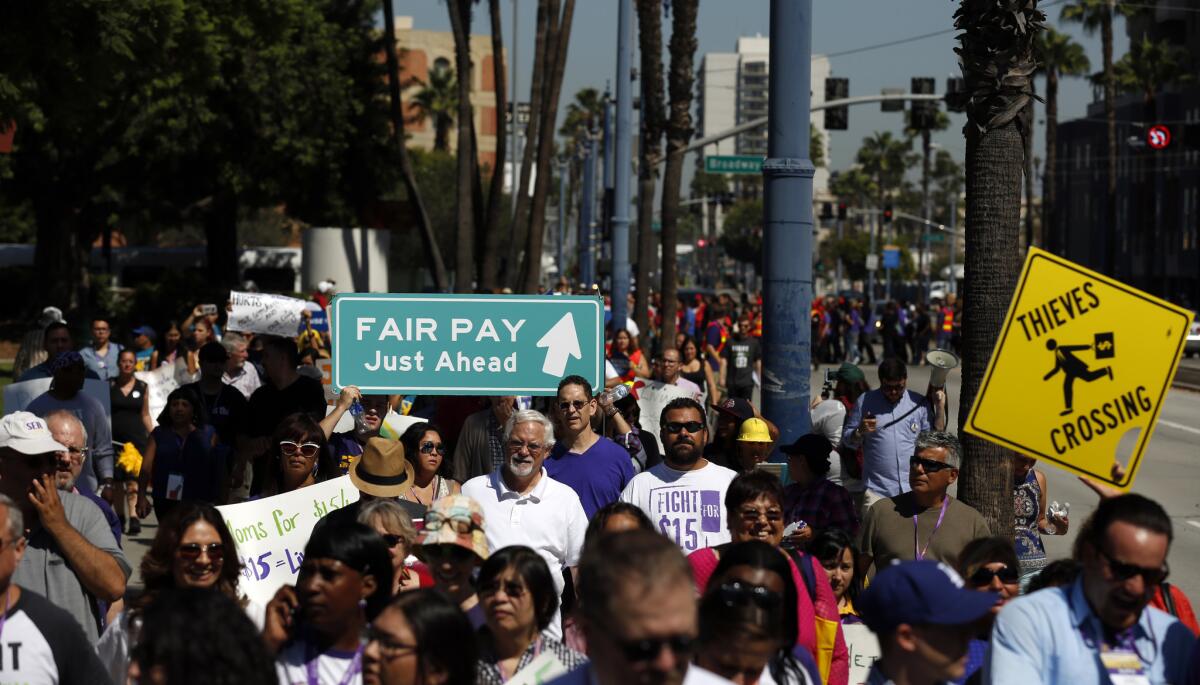Cities want to raise the minimum wage. But it’s complicated.

Marchers in Long Beach in September call for increasing the minimum wage. The city last month adopted a timeline that will increase the base wage to $13 by 2019 and potentially to $15 two years later.
After the city of Los Angeles adopted a plan last summer to raise the minimum wage to $15 by 2020, there was a burst of activity by neighboring municipalities.
Los Angeles County supervisors followed suit soon after with an identical schedule for unincorporated areas, where about 1 million people live. City and county officials expressed hope that the actions would prompt many of the other 87 independent cities within the county to follow their lead and avoid a patchwork system of different wage schedules throughout the county.
Some have, but with one, and possibly two, labor-backed statewide initiatives on the minimum wage planned for the November ballot, advocates and experts said they expect to see the movement of local initiatives slow to a trickle.
Last month, Long Beach, the county’s second-largest city, adopted a slightly more conservative timeline that will increase the base wage to $13 by 2019 and potentially to $15 two years later. Santa Monica — a smaller, but well-known and affluent coastal city — adopted a plan that mirrors L.A. city and county measures, but with additional requirements for added sick days and an exemption for unionized businesses. And most recently, the city of Pasadena adopted a similar wage increase this month, which will also put it on track to $15 by 2020, but with a mandatory review of economic effects midway through.
One ballot initiative would raise the statewide wage to $15 by 2021. Proponents submitted signatures last month to qualify it for the ballot. Voters could also end up being confronted by a competing proposal with slightly different terms, backed by a different faction of the same Service Employees International Union.
Raphael Sonenshein, executive director of the Pat Brown Institute for Public Affairs at Cal State L.A., said the statewide effort “is pretty much going to preoccupy all elements of labor for months, I would assume.”
And cities that have not yet acted “may decide it’s better to avoid a difficult vote,” he said. “There’s a lot of logic for something of a pause.”
Rusty Hicks, head of the Los Angeles County Federation of Labor, acknowledged that local efforts are likely to slow.
“Great progress has been made in the past year and a half with regards to the minimum wage,” he said. “Now I think there will be a question for some jurisdictions as to whether you move forward with a local program or simply wait for a state policy.”
Hicks gathered with Pasadena city officials and labor activists at an area day labor center the weekend before that city’s minimum wage vote. During a speech there, Richard Trumka, head of the AFL-CIO, praised the impending wage increase.
In an interview, Trumka said he is optimistic at the prospects of a statewide increase, and the action by cities such as Pasadena “puts pressure on those who don’t do it,” because workers will go to the areas with the highest wages.
Some other cities have begun to explore the possibility of moving on their own wage increases, including West Hollywood, Malibu, Glendale and Pomona. But a majority of cities in Los Angeles County have made no move, and officials in some said they don’t intend to.
Santa Clarita, the county’s third-largest city, is surrounded by a county unincorporated area where the wage increase will take effect. Mayor Bob Kellar said the city had received inquiries from businesses in the county area interested in moving into the city limits to avoid the higher costs. No discussions of a wage hike in the city have occurred, he said.
“I would certainly oppose anything of this kind,” Kellar said. But he added, “Lord knows what’s going to come out of the state.”
In Glendale, the fourth-largest in the county, city officials have begun studying a possible wage hike. But Mayor Ara Najarian said they will probably hold off on acting until the statewide question is decided.
“If it’s something that could be settled by the voters in a statewide initiative, probably we’re not going to be too excited about going through the brain drain and the political capital expenditures of making a move on it,” he said.
Najarian said Glendale has been getting pressure from both sides of the debate because other local cities have moved on local minimum wage ordinances.
“I hope there’s some action statewide,” he said. “It would really take the pressure off us as a city.”
Twitter: @sewella
ALSO
L.A. developers accused of stealing millions in affordable-housing scheme
Winter gone? Temperatures nearing 90 degrees in Southern California with gusty winds
More to Read
Sign up for Essential California
The most important California stories and recommendations in your inbox every morning.
You may occasionally receive promotional content from the Los Angeles Times.











